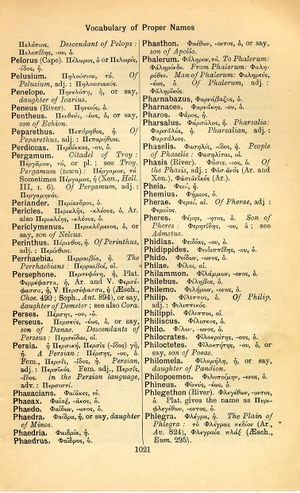Phasis: Difference between revisions
Εἰ θνητὸς εἶ, βέλτιστε, θνητὰ καὶ φρόνει → Mortalis quum sis, intra mortalem sape → Bist sterblich du, mein Bester, denk auch Sterbliches
(Names) |
(6_12) |
||
| Line 3: | Line 3: | ||
<b class="b2">Of the Phasis</b>, adj.: [[Φασιανός]] (Ar. and Xen.), Φασιανικός (Ar.). | <b class="b2">Of the Phasis</b>, adj.: [[Φασιανός]] (Ar. and Xen.), Φασιανικός (Ar.). | ||
}} | |||
{{Lewis | |||
|lshtext=<b>Phāsis</b>: ĭdis or ĭdos (acc. also Phasin, Prop. 3, 22, 11; Sen. Cons. Helv. 10, 3:<br /><b>I</b> Phasim, Verg. G. 4, 367 al.; voc. Phasĭ, Ov. P. 4, 10, 52), m., = [[Φᾶσις]]>.<br /> <b>A</b> A [[river]] in [[Colchis]], [[which]] empties [[into]] the Euxine Sea, [[now]] Rion, Mel. 1, 19, 12; Plin. 6, 4, 4, § 12: limosi Phasidos undae, Ov. M. 7, 6: sua jura cruentum Phasin habent, Stat. Th. 5, 457: Phasidis [[ales]], a pheasant (v. in the foll. [[Phasiacus]]), id. S. 4, 6, 8; cf.: [[ultra]] Phasin capi volunt, [[quod]] ambitiosam popinam instruat, Sen. Cons. Helv. 10, 3.—<br /> <b>B</b> Transf., a [[town]] and its harbor [[lying]] at the [[mouth]] of the [[Phasis]], a [[colony]] of the Milesians, [[now]] Poti, Mel. 1, 19, 12; Plin. 6, 4, 4, § 13.—Hence,<br /> <b>A</b> Phāsis, ĭdis, adj. f., Phasian; [[poet]]. Colchian: volucres, i. e. pheasants, Mart. 13, 45, 1.—Subst.: Phāsis, ĭdis, f., the Colchian, a [[term]] applied to [[Medea]]; acc. Phasida, Ov. F. 2, 42.—<br /> <b>B</b> Phā-sĭăcus, a, um, adj., = Φασιακός, of or belonging to the [[Phasis]], Phasian; also [[poet]]. Colchian: [[angulus]], Mel. 2, 2, 5: [[unda]], Ov. Tr. 2, 439: [[terra]], id. R. Am. 261: [[corona]], [[which]] [[Medea]] presented to [[Creusa]], id. Ib. 605: [[ales]] Phasiacis petita [[Colchis]], i. e. the pheasant, Petr. 93.—<br /> <b>C</b> Phāsĭānus, a, um, adj., = [[Φασιανός]]>, of or belonging to the [[Phasis]], Phasian: Phasianae aves, pheasants, Plin. 10, 48, 67, § 132.—As subst.: phāsĭāna, ae, f., a pheasant, Plin. 11, 33, 39, § 114.— More freq., phāsĭānus (fāsĭān-), i, m., Suet. Vit. 13; Pall. 1, 29; Lampr. Alex. Sev. 41 fin.; Edict. Diocl. p. 14.—According to the [[myth]], it is the metamorphosed [[Itys]], [[daughter]] of [[Tereus]]; v. [[Itys]].—<br /> <b>D</b> Phā-sĭas, ădis, adj. f., = Φασιάς, of or belonging to the [[Phasis]], Phasian; [[poet]]. Colchian: Phasias Aeetine, Ov. H. 6, 103: [[puella]], i. e. [[Medea]], id. P. 3, 3, 80.—Subst.: Phāsĭas. ădis, f., [[Medea]], Ov. A. A. 2, 382.<br /><b>Phāsis</b>: ĭdis, adj., v. 1. [[Phasis]], A. | |||
}} | }} | ||
Revision as of 08:50, 13 August 2017
English > Greek (Woodhouse)
(River) Φᾶσις, -ιος, ὁ.
Of the Phasis, adj.: Φασιανός (Ar. and Xen.), Φασιανικός (Ar.).
Latin > English (Lewis & Short)
Phāsis: ĭdis or ĭdos (acc. also Phasin, Prop. 3, 22, 11; Sen. Cons. Helv. 10, 3:
I Phasim, Verg. G. 4, 367 al.; voc. Phasĭ, Ov. P. 4, 10, 52), m., = Φᾶσις>.
A A river in Colchis, which empties into the Euxine Sea, now Rion, Mel. 1, 19, 12; Plin. 6, 4, 4, § 12: limosi Phasidos undae, Ov. M. 7, 6: sua jura cruentum Phasin habent, Stat. Th. 5, 457: Phasidis ales, a pheasant (v. in the foll. Phasiacus), id. S. 4, 6, 8; cf.: ultra Phasin capi volunt, quod ambitiosam popinam instruat, Sen. Cons. Helv. 10, 3.—
B Transf., a town and its harbor lying at the mouth of the Phasis, a colony of the Milesians, now Poti, Mel. 1, 19, 12; Plin. 6, 4, 4, § 13.—Hence,
A Phāsis, ĭdis, adj. f., Phasian; poet. Colchian: volucres, i. e. pheasants, Mart. 13, 45, 1.—Subst.: Phāsis, ĭdis, f., the Colchian, a term applied to Medea; acc. Phasida, Ov. F. 2, 42.—
B Phā-sĭăcus, a, um, adj., = Φασιακός, of or belonging to the Phasis, Phasian; also poet. Colchian: angulus, Mel. 2, 2, 5: unda, Ov. Tr. 2, 439: terra, id. R. Am. 261: corona, which Medea presented to Creusa, id. Ib. 605: ales Phasiacis petita Colchis, i. e. the pheasant, Petr. 93.—
C Phāsĭānus, a, um, adj., = Φασιανός>, of or belonging to the Phasis, Phasian: Phasianae aves, pheasants, Plin. 10, 48, 67, § 132.—As subst.: phāsĭāna, ae, f., a pheasant, Plin. 11, 33, 39, § 114.— More freq., phāsĭānus (fāsĭān-), i, m., Suet. Vit. 13; Pall. 1, 29; Lampr. Alex. Sev. 41 fin.; Edict. Diocl. p. 14.—According to the myth, it is the metamorphosed Itys, daughter of Tereus; v. Itys.—
D Phā-sĭas, ădis, adj. f., = Φασιάς, of or belonging to the Phasis, Phasian; poet. Colchian: Phasias Aeetine, Ov. H. 6, 103: puella, i. e. Medea, id. P. 3, 3, 80.—Subst.: Phāsĭas. ădis, f., Medea, Ov. A. A. 2, 382.
Phāsis: ĭdis, adj., v. 1. Phasis, A.

